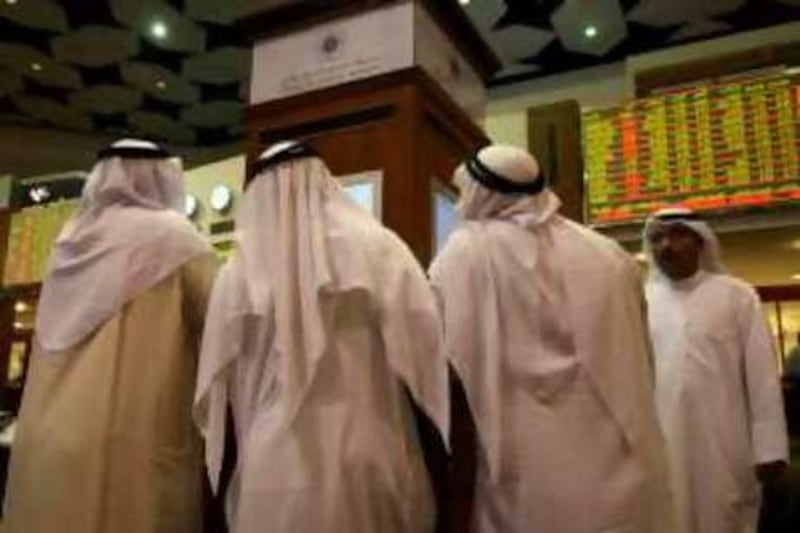Even as Dubai's business and financial community works to steady its ship in stormy international markets, the emirate continues to struggle with a series of internal corruption investigations likely to shape its economic trajectory at least as much over time. The global financial and equities meltdown has raised some questions about the solidity of the country's financial and property markets. But whatever the near-term consequences, the persistent investigations underscore that fighting corruption remains a priority. "It's a process you can't reverse or slow down, whatever the consequences," said Mohammed Ali Yasin, the managing director of Shuaa Securities. "Now is as good a time as any to root out corruption and finish what Dubai has started. The long-term benefits outweigh the damage the anti-corruption drive could do in the short-term."
Dubai's business community started hearing the reports of alleged corruption and financial misdeeds in some of biggest listed and private financial and real estate companies in April. Media broke the news that Zack Shahin, the former chief executive of the property firm Deyaar Development, had been in jail for weeks, the subject of a corruption investigation. A series of arrests since then have highlighted the underdeveloped regulatory system, an unwillingness of corporations to share information and a hush-hush approach of investigators - all of which have kept observers and investors guessing about the actual nature of alleged wrongdoing and how the bottom lines of the firms may be affected.
Yet there also appears to be a determined effort to begin addressing some of the shortcomings that have been exposed. Arrests have included chief executives of finance, mortgage and real estate firms, owners of property projects and advertising firms, private investors, top bankers, middle managers and sales executives. The message was loud and clear when the media office of Sheikh Mohammed bin Rashid, Vice President of the UAE and Ruler of Dubai, released a Public Prosecution statement saying that "fighting corruption is at the top of the [Dubai] Government's priorities". The unusual public statement was the first acknowledgement that the Dubai authorities were conducting a co-ordinated series of investigations aimed at alleged white-collar financial improprieties.
Dubai has been trying to leverage its geographical location to set up a financial centre that would bridge established financial hubs in western and Asian regions. However, corporate governance, compliance, transparency, arbitration regulations, and timely and accurate disclosures are some of the stumbling blocks that have prevented Dubai from so far rivalling some of the more transparently regulated financial hubs such as New York, London and Singapore.
The deficiencies revealed by the long-running investigations so far are occurring on three fronts: internal controls, transparency and follow-through. While almost no information has been revealed concerning the details of any alleged wrongdoing, the range of companies and executives that have been swept up in the allegations has raised questions about control over and monitoring of operations. "It is really shocking why internal and external auditors could not detect what, in some cases, had been going on for months the companies," said Wadah Taha, a senior Dubai-based analyst. "So many investigations only suggest that the internal and external auditor have not been par excellence."
Mr Yasin said auditors, or the lack of forcefulness displayed by them, may explain some of the problems. "Auditors need to be reminded [that] they are employed by the shareholders to protect their interest," he said. "The board pays the cheque but that does not mean they [the auditors] have loyalty with the board," he said. According to Mr Taha, if the standards of auditing were high enough, a lot of what has surfaced could have been prevented. "They should be changing auditors every two or three years."
Deyaar kept its investors in the dark about the investigation for almost two weeks and did not inform the Dubai Financial Market, where its shares are traded. The Dubai Islamic Bank, the country's largest and oldest Islamic bank, was the next to be investigated, followed by Tamweel, the private property developer Sama Dubai and state-controlled Nakheel - and all kept information away from the public for periods of time.
The most high-profile arrests so far are those of Adel al Shirawi, the former chief executive of Tamweel, and Feras Kalthoum, the former head of finance of Tamweel, which kept the news of its former top executives out of the market for more than a week. Tamweel did the same when its deputy chief executive, Abdullah Nasser Abdullah, was arrested earlier this month and waited for the media to break the news instead of informing its own shareholders.







